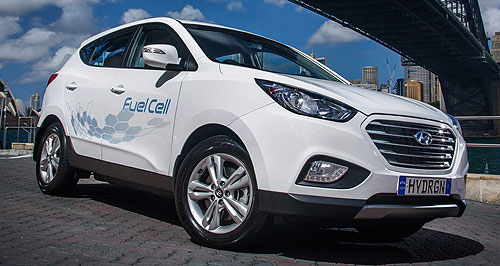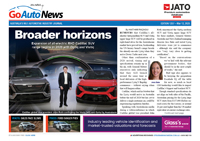News - General News - TechnologyGovernment's fuel-cell support comes too lateNo noise: Mercedes-Benz Australia/Pacific claims the government showed “zero interest” when it displayed the B-Class F-Cell cars in Australia in 2011. 'We were ignored' playing field isn’t level, says fuel-cell-ready Mercedes-Benz7 Apr 2015 By TIM ROBSON MERCEDES-BENZ Australia/Pacific has reacted angrily to the news that the federal government now appears to support hydrogen fuel-cell electric vehicles and related infrastructure – without committing to funding – despite apparently ignoring the technology only three years ago. The German car-maker detailed its first-generation B-Class-based F-Cell hydrogen fuel-cell vehicle back in 2009, before it went on sale in strictly limited numbers in Europe and the United States. Benz has produced a number of fuel-cell-powered concepts in recent years and even brought a handful of examples to Australia as a part of a global roadshow in 2011, highlighting the technology, but the company says there has been little support from the current and former federal government until now. Mercedes-Benz Australia/Pacific senior manager public relations, product and corporate communications David McCarthy said the federal industry and science minister Ian Macfarlane appears to have changed tack following his party's lack of interest four years ago. “I’d suggest the minister has had a conversion on the way to the hydrogen tank,” Mr McCarthy told GoAuto. “When we brought out the B-Class F-Cell cars a few years ago (in 2011), we had zero interest from the Labor government of the day, zero interest from the Liberals and zero interest from the Greens. “It’s great that the discussion is being had – but what is the government going to do about it? It makes $480 million a year in Luxury Car Tax, and it makes that predominately on cars that are the most fuel-efficient on the market. Why doesn’t it invest some of that into hydrogen refuelling infrastructure.” Mr McCarthy’s comments came as minister Macfarlane launched Australia’s first passenger-car hydrogen refuelling station at Hyundai Motor Company Australia’s headquarters in Sydney. The minister said the government would look at implementing regulations to bolster the fledgling industry, but commercial interests would have to take the lead. “If these (fuel cell) cars started selling in the thousands, as distinct from electric vehicles and hybrid vehicles that don’t sell in those numbers, the government’s role is to overcome the commercial gap, so to speak,” the minister told GoAuto. “If there’s a commercial gap, obviously we’d look at what we needed to do, whether it was regulation or some sort of assistance in some way. “Ultimately, if the demand is there, the stations are going to get rolled out. It’ll depend on demand. It will be very interesting – you’ll have a Toyota, you’ll have a Hyundai, you’ll start to get hydrogen-powered vehicles, and the demand will start to build in, say, Sydney and then Melbourne and Brisbane.” Minister Macfarlane also noted that moving forward with hydrogen infrastructure might be more cost-effective in the long term. “Do you invest in rolling out recharging stations and battery-swap stations, or do you say ‘hang on, you can fill a tank with hydrogen for $60, the technology cost is comparable. They are targeting (a price for) these vehicles in the 60 to 70 (thousand-dollar) range, which is cheaper than a Tesla (electric car). “Why would you invest in a technology that doesn’t give you the same flexibility (as a regular-fuel car)? Why wouldn’t you just leapfrog it and go straight to hydrogen?” he said. Hyundai’s ix35 Fuel Cell, Honda’s FCX Clarity and Toyota’s new Mirai are the only three production-spec fuel-cell electric passenger vehicles currently on the market around the world. The Volkswagen Group recently displayed the VW Golf HyMotion concept and the Audi A7 h-tron quattro, while Daimler AG, Ford Motor Company, and Renault-Nissan Alliance have signed an agreement for the joint development of a common fuel-cell system for mass-market FCEVs to appear as early as 2017. Mr McCarthy acknowledged that current EV and hybrid technology is not the final step in alternative motoring, but it’s an important step to take. “It’s true to say that hybrids and electric cars are transitional technologies. But they are still very important as a demonstration of what is possible technically,” he said. “The reality is that our government, unlike other governments overseas, has not provided any incentives for electric-vehicle ownership, and that will always hold it back.” Mr McCarthy said the automotive industry would welcome the opportunity to further the discussion about fuel-cell electric vehicles in Australia. “If the government really wants this future, we’d be happy to discuss it, Honda would be happy to discuss it, Toyota would be happy to discuss it in fact any manufacturer with an interest in the technology would be happy to discuss it,” he said. “We acknowledge the good work that Hyundai is doing in pushing the FCEV cause, but the reality is that without government assistance and support, how will people be able to afford to buy them.” In contrast to Hyundai, Toyota Australia has not taken any high-profile steps to push the cause of its FCEV program, saying that it is confident that hydrogen will become a popular energy source for vehicles going forward. In a brief statement, Australia’s number one car company indicated that is awaiting the relevant infrastructure to be in place before moving forward. “Toyota is confident that hydrogen will become an increasingly popular energy source for powering vehicles around the world,” said product public relations manager Stephen Coughlan. “Globally, we have already launched hydrogen fuel-cell vehicles and the Mirai is already proving very popular in Japan. It’s exciting new technology and it’s certainly something that we will explore further. “Before it can be rolled out locally, however, we first need to have the relevant infrastructure in place.”  Read more1st of April 2015  Hyundai pumps up hydrogen in SydneyMinister applauds Hyundai hydrogen plans but commits no funding for infrastructure9th of December 2014  First Hyundai ix35 Fuel Cell arrivesAustralian Hyundai ix35 Fuel Cell trials are go with next-gen on the way9th of December 2014  Exclusive: Hyundai starts Australia’s hydrogen raceHyundai pioneers hydrogen era in Australia with ix35 Fuel Cell, refuelling station |
Click to shareGeneral News articlesResearch General News Motor industry news |
















Facebook Twitter Instagram